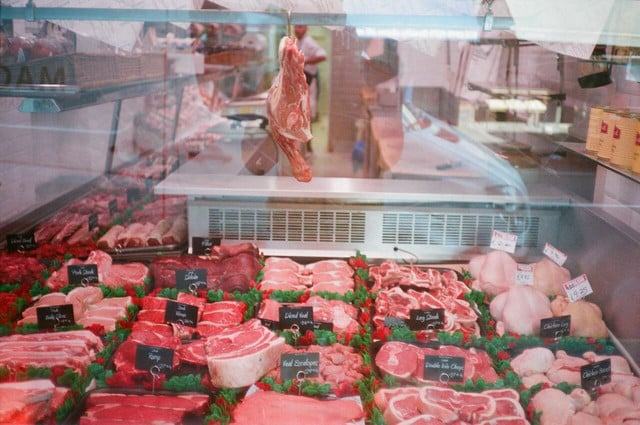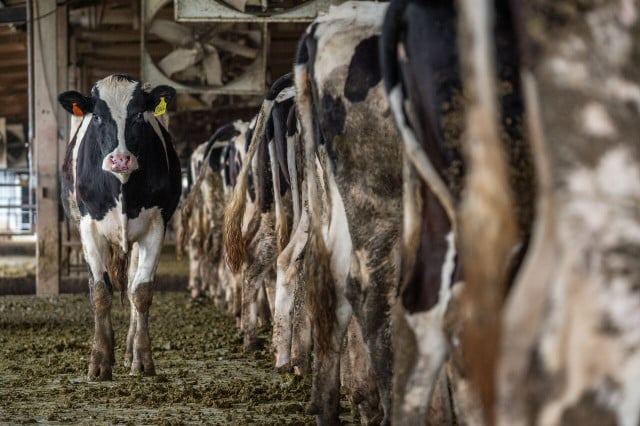Are humans supposed to eat meat? Here are the environmental, ethical and health perspectives you need to make your own judgment about this controversial question.
Whether or not you eat meat, you’ve likely heard these common arguments: eating meat has always been a part of human life, or we need meat to get enough protein in our diets. Are these points true? Let’s delve into humans’ history of eating meat, its nutritional value and its environmental impact. We’ll answer the question: Are humans supposed to eat meat?
The History of Humans and Meat

Around 2.6 million years ago, meat began to constitute a significant portion of the diet of early humans. Pre-humans were herbivores, picking berries from bushes and root veggies from the soil. The historical shift from being herbivores to carnivores (from eating plants to consuming meat) led to a surge in nutrient intake, subsequently enhancing energy and brain functionality. This is because meat naturally contains a higher density of nutrients compared to fruits and vegetables.
Meat consumption demanded significantly less effort in sourcing and consumption compared to the equivalent volume of vegetables that would deliver the same calorie and nutrient content. Essentially, early humans opted to eat what was readily available and what necessitated the least effort to procure and eat.
Researchers have found that as early humans shifted their diet from tough root vegetables to meat and later learned how to process and cut meat into smaller pieces, there was a corresponding decrease in the need for sharp teeth, strong chewing muscles and large digestive systems. The prevailing theory is that these dietary advancements precipitated other evolutionary changes, such as the development of more sophisticated speech organs and increased brain size.
Moreover, collective hunting likely served as a catalyst for language progression. This forms the basis of the commonly held belief that humans require meat.
Nevertheless, there eventually came a period where meat consumption diminished. This change was primarily driven by environmental constraints, such as the need to sustain larger populations, and cultural modifications, like religious doctrines enforcing restrictions on meat consumption. The resurgence of a diet heavy in meat is seen as a byproduct of industrialization and urbanization in Europe and North America, beginning in the 1850s.
While meat may have been crucial for survival and societal development during the era of hunter-gatherers, today’s world is characterized by readily accessible supermarkets, round-the-clock food delivery services and an increasing awareness of climate change. The historical interplay between humans and meat consumption does not detract from the fact that the dietary needs of a 21st-century individual require less meat than our predecessors — potentially none at all.
Can Humans Digest Meat Properly and Does It Provide Nutrients?



Humans are omnivores, which means we have the freedom to choose whether to consume meat, unlike many animals whose dietary habits are determined by their physical makeup. Several anatomical indicators suggest that humans may be better suited to plant-based diets — or at least those mostly plant-based. For example, our teeth, which are tightly spaced and flat, are ideal for chewing softer substances like fruits and vegetables, unlike the widely spaced and sharper teeth found in carnivores.
Additionally, carnivores such as lions and tigers typically have shorter digestive systems than humans, facilitating quicker digestion of meat. In contrast, our longer digestive tracts, a trait more common in herbivores, enable us to absorb fibers and nutrients from plant-based foods thoroughly. Our bodies also do not efficiently digest blood.
While it’s true that meat offers a range of nutrients, including healthy fats, proteins, iodine, zinc, omega-3 and iron, these benefits can be overshadowed by undesirable elements like high levels of saturated fats and sodium. Nevertheless, it’s crucial not to eliminate meat from your diet without appropriately supplementing these nutrients with plant-based or vegetarian protein.
If you’re considering becoming a vegan, make sure to learn how to maintain a balanced nutrient intake. This could include investigating various sources of plant-based protein, for example.
Here are vegan alternatives to nutrients typically found in meat and how to benefit from them:
- Maintain your iron levels by including lentils, chickpeas, beans, tofu, kale and cashew nuts. Pair them with Vitamin C-rich foods like broccoli or peppers to improve iron absorption.
- Opt for tofu, tempeh and legumes as protein-rich vegan options. A single block of tofu offers the same protein content as a three-ounce steak. For more, refer to our guides on Tofu Health Benefits and 6 High Protein Vegan Breakfast Recipes.
- Ensure sufficient iodine intake by using iodized salt in your meals.
- Include tofu, yogurt, oatmeal, shiitake mushrooms, and spinach for their high zinc content.
- Incorporate walnuts, hemp and chia seeds into your meals to secure adequate omega-3 fatty acids.
Interested in learning more about tofu, the superstar meat-free protein? Read How Is Tofu Made? From Bean to Block.
Do Humans Need to Eat Meat?



The subject of Vitamin B12 often emerges in discussions about reducing or eliminating meat consumption. Vitamin B12 is a critical nutrient that aids in the formation of red blood cells and supports a healthy nervous system. Many believe that meat is a natural source of Vitamin B12.
However, Vitamin B12 does not naturally exist in meat. It originates in the soil and is ingested and digested by grazing animals like cows and goats. Recent research shows that due to intensive modern farming methods, our soils are deficient in cobalt, a vital element needed to produce Vitamin B12. This deficiency is reflected in the human population, with up to 40% of individuals, whether meat eaters or vegans, having marginal or deficient B12 levels.
This fact largely undermines the argument for consuming meat solely for Vitamin B12. It’s worthwhile to consider Vitamin B12 supplementation, regardless of whether your diet includes meat.
All other nutrients typically found in meat — proteins, zinc, iron, iodine and healthy fats — are also available in plant-based foods. Therefore, meat is not an intrinsic requirement in the human diet. Our omnivorous nature signifies that while we can include meat in our diets, it isn’t essential for our survival or overall well-being. Numerous vegan and vegetarian athletes demonstrate that meat is not required for energy production, muscle growth or general health.
Regrettably, nutrition has not been prioritized in American medical education, leading to many physicians advocating for good old-fashioned meat consumption. As always, it’s vital to conduct your own research and question whether these recommendations are scientifically grounded or merely reflective of your doctor’s personal preferences.
For guidance on achieving a balanced vegan diet, refer to resources like The Vegan Food Pyramid.
Are Humans Supposed to Eat Meat?



The question “Are humans supposed to eat meat?” gains significant relevance when viewed from an environmental standpoint. The dietary choices we make have far-reaching implications and are no longer just a matter of personal preference. By 2050, we will need to feed an additional two billion people.
The choice between a diet centered around meat or plants will profoundly impact our planet and food security. It’s important to note that a diet heavy in meat exacts a higher environmental toll than one centered around fruits, grains and vegetables.
Adopting a vegan diet stands as one of the most straightforward and effective methods of reducing your carbon footprint. Global livestock account for 14.5% of all greenhouse gas emissions worldwide. If everyone adopted a vegan lifestyle, we could reduce carbon dioxide emissions by eight billion tons by 2050. Even if we all became vegetarians, we could still reduce CO2 emissions by nearly six million tons, compared to a ‘business-as-usual’ scenario.
From an ethical angle, consider the severe conditions endured by animals in large-scale factory farms. Nearly 99% of the meat in the United States originates from these facilities, characterized by the confinement of a high number of animals in small, often sunless spaces, with conditions that disregard the animals’ natural behaviors. This brutal system, primarily driven by profit maximization, operates at the expense of animal rights.
Factory farming typically involves harsh procedures like mutilation without anesthesia, artificial insemination and separation of mothers from their newborns, causing emotional distress. Beyond the harm to animals, it’s noteworthy that three out of four emerging infectious diseases in humans originate from animals, particularly when they are confined in settings like factory farms.
Ultimately, avoiding meat consumption can contribute significantly to your overall health. Vegans and vegetarians generally exhibit lower body mass index, reduced risk of heart disease, lower cholesterol and blood pressure levels, decreased risk of type 2 diabetes, lower cancer rates and other health benefits. These are just a few examples of the many benefits of going vegetarian or vegan.
For many, consuming meat is simply habitual. However, the points discussed in this article may help illustrate that meat isn’t necessary for a healthy daily diet. Always remember that progress is more important than perfection. Try adopting a flexitarian diet to get the ball rolling!
Read more:
- Vegan Ground Beef: How to Make Plant-Based Taco Meat
- Ranch vs. Farm: Differences, Similarities and Importance
- “No Credible Pathway” to Keep Temperature Rise Below 1.5C. What Now?
Important Information regarding Health-related Topics.
** Links to retailers marked with ** or underlined orange are partially partner links: If you buy here, you actively support Utopia.org, because we will receive a small part of the sales proceeds. More info.Do you like this post?









